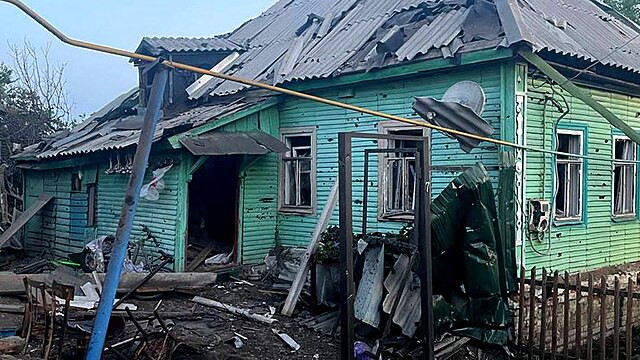Ukrainian forces continue their significant incursion into Russia's Kursk region, advancing further and intensifying the conflict. The third day of this major offensive has seen Ukrainian armored units reaching the village of Bolshoe Soldatskoe, approximately 18.5 miles inside Russian territory, as reported by Rybar, a prominent pro-Kremlin military blog closely linked to Russia's defense ministry.
Despite claims by Russia's defense ministry that Ukrainian advances have been halted, multiple pro-Kremlin military bloggers paint a grimmer picture. They report heavy fighting near the town of Lgov, only nine miles away, and significant Ukrainian movements deeper into Russian territory. The scale of this attack, involving at least two Ukrainian brigades, marks one of the most substantial military developments in months.
"Despite the attempts of the Russian joint forces group to stop the advance of Ukrainian mobile groups, the scale of the crisis is widening," Rybar posted on Telegram. The blog's reports contradict the Russian defense ministry's assertions and suggest a more chaotic situation on the ground.
The offensive began on Tuesday with a large Ukrainian force crossing the border near the village of Sudzha, equipped with tanks and heavy weaponry. This unexpected move allowed Ukrainian soldiers to quickly seize several villages, advancing up to nine miles. The Ukrainian forces have since brought in significant reinforcements and continued to push forward, with heavy fighting reported in Sudzha and Korenovo.
BREAKING: The Ukrainian Army continues to advance in the Russian Kursk region, breaking through additional defensive lines. In this video, they take 50 Russian soldiers as prisoners of war. It’s the first time in 70+ years that Russia is being invaded pic.twitter.com/DQwNH70K5G — Visegrád 24 (@visegrad24) August 8, 2024
As the Ukrainian operation unfolds, it has become clear that this is not a minor raid but a substantial invasion. The involvement of the 80th Air Assault Brigade, known for its speed and firepower, underscores the seriousness of the Ukrainian effort. Videos circulating on social media depict Ukrainian tanks, mine-clearing vehicles, engineering vehicles, and U.S.-made Stryker armored personnel carriers moving through the region, supported by mortar crews. This brigade, alongside the 22nd and 88th Mechanized Brigades, has been pivotal in the operation, demonstrating Ukraine's ability to launch swift and powerful attacks. The presence of such elite units indicates Ukraine's commitment to this offensive, which could significantly impact the dynamics of the conflict. The Ukrainian government has remained largely silent about the operation's specifics, but Mykhailo Podolyak, an adviser to President Volodymyr Zelenskyy, hinted at broader strategic goals. Podolyak suggested that increasing the war's cost for Russia by inflicting casualties and territorial losses could alter Russian perceptions and potentially influence future negotiations. "This increases the cost of the war for Russia quantitatively," he said on Ukrainian TV. "More armored vehicles have been destroyed, the Russian Federation has lost territories, and there have been more casualties." Zelenskyy praised the Ukrainian army for its capability to "surprise" and achieve results, though he did not directly reference the situation in Kursk. "Everyone can see that the Ukrainian army knows how to surprise. And knows how to achieve results," Zelenskyy stated during an event in Kyiv. Russian President Vladimir Putin, addressing the escalating situation, called for "courage" and urged regional authorities to focus on solving the complex tasks ahead. "This requires a certain amount of courage and concentration on ways to solve these complex, difficult, extraordinary tasks," Putin said during a meeting with Alexei Smirnov, the acting governor of the region.
Ukrainian forces control about 350 square kilometres of Kursk region. The Ukrainians occupy the western half of Sudzha and are advancing east from the minor Sudzha river to the rail line. North, Putin regime forces are making a stand for Malaya Loknya but are in a losing fight. pic.twitter.com/YY3skYUIyQ — Michael MacKay (@mhmck) August 7, 2024
The situation has also led to significant disruptions in the Kursk region. The Russian Ministry of Health reported at least 66 injuries due to shelling since Tuesday, and several railway stations have been closed amid the invasion.
While Ukrainian officials remain tight-lipped about the operation, speculation abounds regarding its objectives. Some analysts suggest Ukraine may be attempting to divert Russian forces from the Donbas region, where Ukrainian troops face intense pressure. Others speculate that Ukraine might be aiming to seize Russian territory to use as leverage in future peace negotiations.
Despite the risks, Ukrainian commanders appear to have achieved operational surprise, catching Russian forces off-guard and forcing them to scramble for an effective response. The success of the Ukrainian operation now hinges on the ability of Russian forces to regroup and counter the advance. If Russian forces can quickly shift and mount an effective defense, they may blunt the Ukrainian gains. However, if they fail to do so, Ukraine could solidify its foothold and potentially gain a significant strategic advantage.




